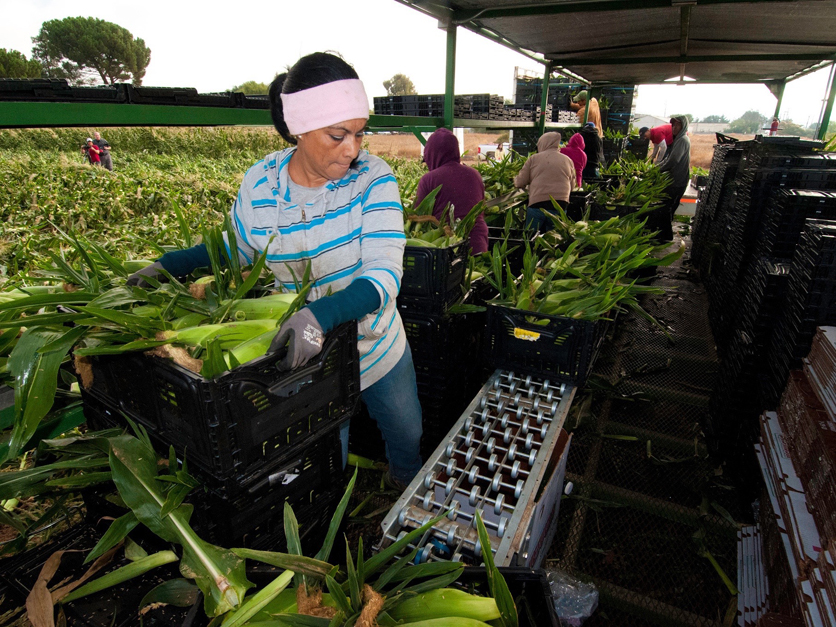In one of his first acts as president, Joe Biden is sending an immigration bill to Congress that offers a pathway to citizenship for about 11 million undocumented workers, including about a million farmworkers.
The bill represents a shift from the policies of President Donald Trump and faces an uncertain future in Congress, where attempts in recent years to fix the immigration system have met with failure.
"The legislation modernizes our immigration system, and prioritizes keeping families together, growing our economy, responsibly managing the border with smart investments, addressing the root causes of migration from Central America, and ensuring that the United States remains a refuge for those fleeing persecution," according to a fact sheet released by the Biden transition team prior to his inauguration Wednesday.
Under the bill, undocumented workers will be able to apply for temporary legal status and have the ability “to apply for green cards after five years if they pass criminal and national security background checks and pay their taxes,” the fact sheet says.
Dreamers, those with Temporary Protected Status, and immigrant farmworkers “who meet specific requirements are eligible for green cards immediately under the legislation,” according to the fact sheet.
“This bill is fundamentally different than what any other president has ever done in emancipating farm workers so they can escape pervasive fear and behave like free women and men," said United Farm Workers President Teresa Romero. "Under the Biden bill, farm workers with work histories would immediately get legal status, along with Dreamers and Temporary Protected Status recipients.”
Romero said, "Not only is its content remarkable, but never before has a U.S. president presented his own comprehensive immigration reform measure on Day One in office. Now we must work to turn this vision into reality.”
The National Council of Agricultural Employers did not comment specifically on the substance of the legislation, but NCAE President and CEO Michael Marsh said NCAE “looks forward to engaging with the Biden administration to find solutions to the vexing challenge of agricultural labor reform. We are committed to working with President Biden and his team to strengthen our national security by enhancing America's food security while promoting the welfare of our workers and the sustainability of our nation's farmers and ranchers.”
“This really does represent a historic shift from Trump’s anti-immigrant agenda that recognizes all of the undocumented immigrants that are currently in the United States should be placed on a path to citizenship,” tweeted Marielena Hincapié, executive director of the National Immigration Law Center.
Citing 2017 Census of Agriculture data, Marsh said there are about 2.4 million farmworkers in the U.S., with about 200,000 of those classified as H-2A workers. About half have work authorization and about 29% were U.S. citizens, according to National Agricultural Worker Survey data from 2015-16.
“After three years, all green card holders who pass additional background checks and demonstrate knowledge of English and U.S. civics can apply to become citizens,” the fact sheet says. “Applicants must be physically present in the United States on or before Jan. 1, 2021,” but the Department of Homeland Security (DHS) “may waive the presence requirement for those deported on or after Jan. 20, 2017 who were physically present for at least three years prior to removal for family unity and other humanitarian purposes.”
Interested in more coverage and insights? Receive a free month of Agri-Pulse West.
The bill would “promote immigrant and refugee integration and citizenship” by providing new funding to state and local governments, private groups, educational institutions, community-based organizations, and not-for-profit organizations “to expand programs to promote integration and inclusion, increase English-language instruction, and provide assistance to individuals seeking to become citizens," the fact sheet says.
The bill also “requires that DHS and the Department of Labor establish a commission involving labor, employer, and civil rights organizations to make recommendations for improving the employment verification process.”
“Workers who suffer serious labor violations and cooperate with worker protection agencies will be granted greater access to U visa relief,” the fact sheet says. “The bill protects workers who are victims of workplace retaliation from deportation in order to allow labor agencies to interview these workers. It also protects migrant and seasonal workers, and increases penalties for employers who violate labor laws.”
The bill “prioritizes smart border controls” by authorizing additional funding for DHS “to develop and implement a plan to deploy technology to expedite screening and enhance the ability to identify narcotics and other contraband at every land, air, and sea port of entry,” the fact sheet says. It also includes funding for training and continuing education “to promote agent and officer safety and professionalism” and “enhances the ability to prosecute individuals involved in smuggling and trafficking networks who are responsible for the exploitation of migrants.”
For more news, go to www.Agri-Pulse.com


